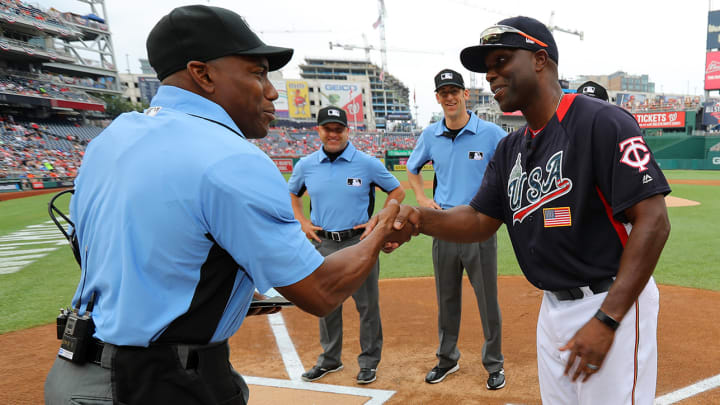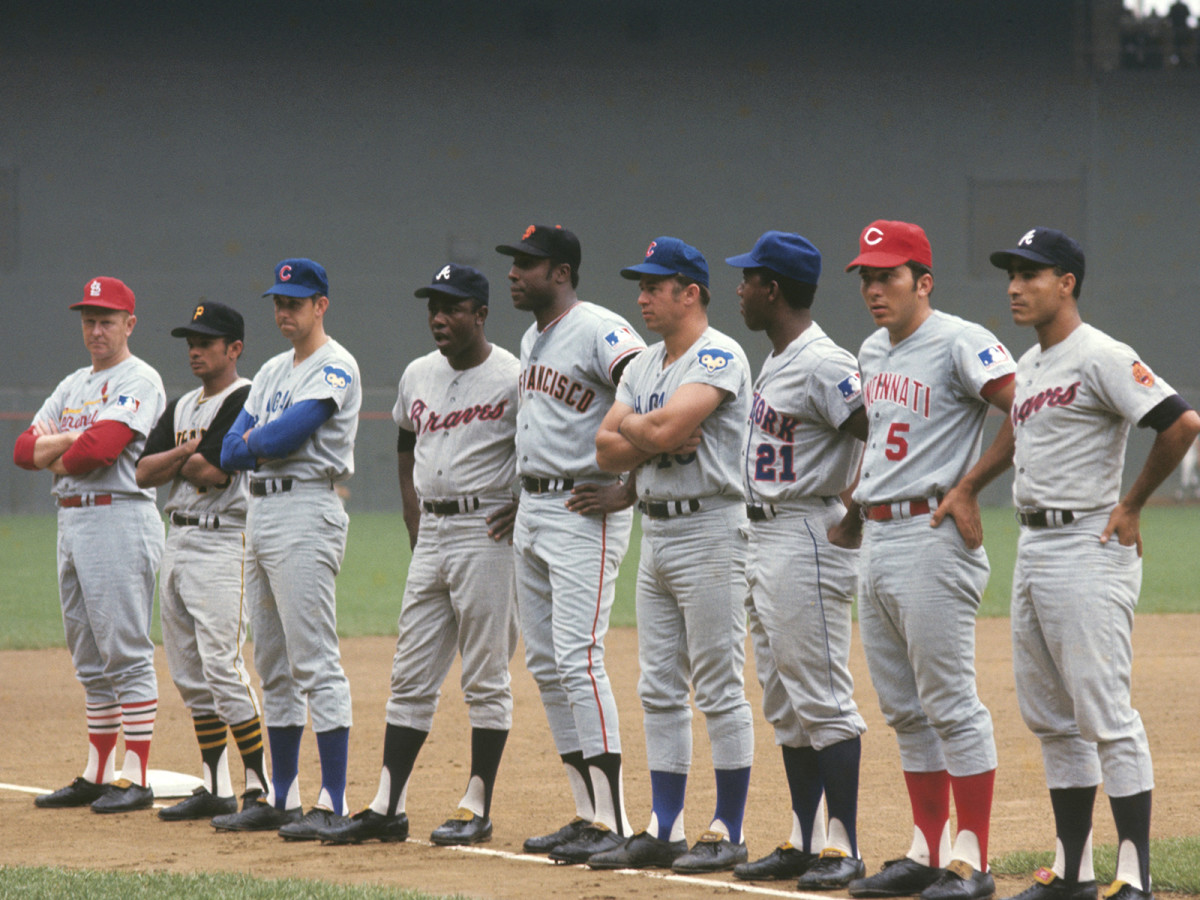Weekend Read: Life as a Home Run Derby Umpire, Dave Roberts's Least Favorite Pitcher and More

WHO ARE THE UMPIRES IN THE HOME RUN DERBY?
WASHINGTON, DC — With the possible exception of a few jaded veterans, just about everyone who participates in All-Star week is thrilled to be there. The Braves’ Nick Markakis, who often looks as if he would rather take a fastball to the ribs than another inane question, brought his three sons to his media availability. Coaches gushed about the VIP treatment. Futures Game MVP Taylor Trammell admitted he could barely tame the butterflies in his stomach.
But there is another group of people being honored at this event: the umpires. SI caught up with Malachi Moore, a Double A ump, between the Futures Game and the Home Run Derby—both of which he worked as crew chief.
SPORTS ILLUSTRATED: Which were you more excited for, the Futures Game or the Home Run Derby?
Malachi Moore: The Futures Game was extra special. There’s nothing that can prepare you for this moment. This is as close to the big leagues as you can get. It’s such a surreal moment. I have my wife, my son and mom here. My son’s fifth birthday is the day of the All-Star Game. I was trying to soak it up, but there’s so much going through your head, your phone’s blowing up, it’s crazy. There’s a lot of great umpires in the minor leagues, and for me to be working this—not just out on the field, but behind the plate—that’s extra special.
SI: How do you prepare for the Derby?
MM: We had a walkthrough the other day. It’s just our training, just like how we do with any call we have to make on the field. Make sure you’re stopped and set, make sure you see the entire play and then you take your time to replay what you just saw in your head, then you make a decision in your head and then you give the visual. You don’t want to wait too long, cause now it’s like, Does he not know where the ball is? Does he not know what’s going on? But you also don’t want to be too quick, to where it’s, Oh no no no I meant—so that can easily backfire on you if you don’t have good timing.
SI: Did you get to pick where you stand?
MM: I had a say. I wanted to be in centerfield because I wanted to kind of take everything in. I was behind the plate, so now it’s the opposite end. Looking at the crowd and just admiring what a beautiful setting this is. It’s all the same guys. John Mang will be the clock operator, the home plate umpire. He’ll be telling the pitcher when to stop, when to go. We’ll have Edwin Moscoso and Kyle McCrady down the lines and I’ll be in center.
SI: Have you watched past Derbies?
MM: We saw the one from last year, and we know some of the umpires who have worked the Futures Game in the past, and they gave us good tips. There’s so many potential distractions around you—cameras, fans, on a higher level than we could ever imagine in the minor leagues. Just being in this setting is distracting, but we’re out here to work and this is an opportunity of a lifetime. We want to really embrace it, because we may not make it to a major league field, so we want to be thankful for what we have.
SI: Has it been as good as you imagined?
MM: I didn’t feel like I was working. It was such a blast. I’m ready to go and I have a lady saying, "Hold on, we gotta wait for TV." We don’t have that in the minor leagues, so we have to get accustomed to that pretty quick. I was definitely nervous yesterday. Tonight for me should be so much fun.
SI: And the most important question: Did you get any swag? It looks like your uniform is just the standard one.
MM: We have nameplates. We have patches we’ll be wearing on the field. Wilson hooked us up with some fresh umpire equipment. My partners back in the minor leagues are like, "Hey, what are we getting?" I gotta get them a polo or a backpack or something, so they can say, "OK, it was worth you being gone."
RECOMMENDED READING
• Who are the men and women behind your favorite franchises? Here is our definitive guide to each and every NFL owner.
• Vaulting ambitions, shifting allegiances, unclear succession plans—NFL teams aren't immune to the issues common to family-owned businesses everywhere. (By Jon Wertheim)
• MLB deserves some praise for its moderate approach with Josh Hader's punishment after years-old offensive tweets surfaced. (By Jack Dickey)
• Sit down for a meal with the Eagles' offensive linemen and you're in for plenty of laughs and endless racks of ribbing. (By Alex Prewitt)
• The NFL’s female owners continue to gain power and influence in a notorious boys club. (By Jenny Vrentas)
• After moving on from Kawhi Leonard, what's next for Gregg Popovich and the Spurs? (By Jeremy Woo)
VAULT PHOTO OF THE WEEK:

MLB's All-Star Game returned to Washington D.C. for the first time since 1969, when the photo above was taken at RFK Memorial Stadium. How many Hall of Famers can you count in that snippet of the National League squad? (Spoiler: It's more than half of them.) Don't overlook the stirups, either. Photo taken by Neil Leifer on July 3, 1969.
BEST OF THE REST
Editor's note: Below are some of our favorite stories of the week not published by SI. This week's list was curated by Kellen Becoats.
• Countless stories have been written about the victims of Larry Nassar’s sexual abuse. I don’t think I’ve read a better one than ESPN's Mina Kimes looking at Aly Raisman’s emergence as an activist and how she’s trying to prevent a similar scandal from ever happening again.
• Victor Luckerson details the destruction of Black Wall Street for The Ringer and gives an in-depth look at one of the most horrific events in U.S. history that is rarely taught.
• Allison P. Davis of GQtakes a look at the bizarre brilliance of two of Hollywood’s brightest black stars in Tessa Thompson and Lakeith Stanfield.
• The Undefeated’s Chris Palmer explores Georgetown’shistory of recruiting as it pertains to race and juxtaposes it with the Hoyas’ star recruit, dunking sensation Mac McClung.
• Bryan Curtis of The Ringer writes a touching farewell to the L.A. Times newsroom.
• How has theUK’s music scene influenced Drake? Ben Beaumont-Thomas of The Guardian writes on the Canadian’s fascination with the UK and vice versa.
• Bill Shaikin of the L.A. Times takes us back to 1968 and details how the Dodgers were almost on the wrong side of history following Dr. Martin Luther King’s assassination.
• A barber’s place in society is sacred—and occasionally very advantageous—as The Undefeated's Jerry Bembry finds out in his story about the barber who “broke” the news of two of the NBA offseason’s biggest moves.
ALL-STAR MANAGER DAVE ROBERTS REVEALS THE PITCHER HE HATED FACING
By Connor Grossman
More than 30 All-Stars in Washington D.C. this week were posed with the question: "Who's the guy you hate to face?" Hitters lamented the pitcher(s) that own them, and vice versa. But the question wasn't only reserved for active players.
While NL All-Star manager Dave Roberts—a speedy outfielder who played 10 seasons—autographed dozens of balls in the clubhouse before the All-Star Game, he faced the same question his players did. He didn't even need to hear more than a few words. "Randy Johnson," Roberts said, without breaking focus from looping his signature between the seams of each ball.
• READ: All-Stars (Mostly) Reveal the Hitter or Pitcher They Hate to Face
"(In my first at-bat against him) he hit me in the ribs," the manager continued." I tried to bunt against him. (Teammate) Juan Pierre told me not to bunt against him. If I do, make sure it’s fair. So I tried to bunt against him on Opening Day and the ball goes down the first base line foul. Next pitch right in my ribs."
That's what you get, apparently, for trying to be sly around a future Hall of Famer.
